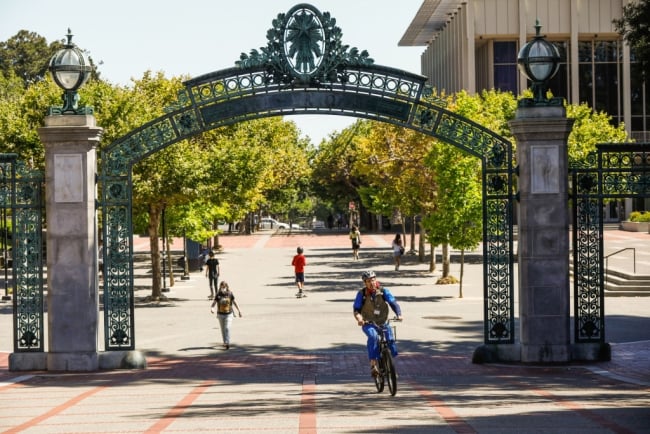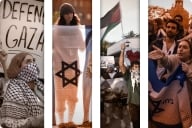You have /5 articles left.
Sign up for a free account or log in.

Attendees of a scheduled talk by an Israeli lawyer at UC Berkeley have reported that they were assaulted and called slurs by the protesters who shut down the event.
Gabrielle Lurie/The San Francisco Chronicle/Hearst Newspapers via Getty Images
Students attending a talk by an Israeli lawyer were forced to evacuate the University of California, Berkeley’s Zellerbach Playhouse Monday night after protesters descended on the venue, breaking two windows and a door.
Several attendees have reported to campus police that they were physically assaulted and called antisemitic slurs by the protesters, according to Berkeley spokesman Dan Mogulof.
The event was hosted by multiple university-recognized Jewish student organizations, Mogulof said. While many other protests have taken place on the Berkeley campus since Hamas's Oct. 7 attack on Israel sparked a retaliatory war in Gaza, this was the first that resulted in any kind of violence, he noted.
About 200 individuals attended the anti-Israel protest, according to a statement sent to the university community by Berkeley Chancellor Carol Christ and Executive Vice Chancellor and Provost Benjamin Hermalin on Tuesday afternoon. Mogulof said that number included both students and non-students.
The incident is the latest in an ongoing series of conflicts between pro-Israeli and pro-Palestinian students on college campuses nationwide. While the majority of such clashes have been peaceful, Berkeley's is not the first that has become dangerous; in October Jewish students at Cooper Union, a private college in New York, were barricaded in the library as pro-Palestinian protesters banged on windows and doors—though no property damage was reported. More recently, pro-Palestinian student protesters were attacked with a chemical weapon when protesting on Columbia University’s campus.
Preparing for Unrest
Berkeley officials expected some unrest concerning the scheduled talk by Ran Bar-Yoshafat, deputy director of the Kohelet Policy Forum, a libertarian Israeli think tank.
“The police only learned of this event Sunday night and, almost immediately, one of the things that was considered and eventually decided was to change the venue,” Mogulof said. “The initial venue was in a building that was believed to be particularly hard to secure.”
As a result, officials relocated the talk to the 550-seat Zellerbach Playhouse. They also deployed extra security guards and dispatched campus police to the event, Christ and Hermalin wrote.
The demonstration appears to have been organized by a pro-Palestinian student group, Bears for Palestine. In a Facebook post Sunday evening, the group called on people to protest the event.
“In October of 2023, Ran Bar-Yoshafat was serving in the IOF, partaking in the obliteration of Gaza and extermination of Palestinians. He has now been invited to speak on our campus to spread settler colonial Zionist propaganda about the very genocide he has participated in. This individual is dangerous,” the post read. “Ran Bar-Yoshafat has Palestinian blood on his hands. He has committed crimes against humanity, is a genocide denier, and we will not allow for this event to go on. GENOCIDAL MURDERS OUT OF BERKELEY.”
“IOF” is a pejorative acronym used by some pro-Palestinian activists to refer to the Israel Defense Forces, replacing “defense” with “offensive” or “occupation.”
Officials canceled the event after protesters smashed two windows and a door. Four attendees also reported that they were attacked by protesters; two alleged battery, one alleged he was injured in a tussle as he tried to force the venue's door closed to prevent protesters from entering, and one reported being taunted by antisemitic slurs. All four incidents are under investigation; the latter is being investigated as a hate crime.
Attendees and Bar-Yoshafat were evacuated through the theater’s back entrance.
“We approach events like this with two priorities: to do what we can so that the event can go forward, and to do what we can to safeguard student safety and well-being,” Christ and Hermalin wrote in their message to the community. “Last night, despite our efforts and the ample number of police officers, it was not possible to do both given the size of the crowd and the threat of violence.”
In a statement released after the event, Bears for Palestine admonished the university for allowing Bar-Yoshafat to come to campus, arguing that he holds “genocidal values that pose a significant threat to the safety and well-being of Palestinian, Arab, and Muslim students on campus.” The statement said that protesters were encouraged to demonstrate peacefully and that the shattering of a window was an isolated incident, though it did not address the other claims of violence. Additionally, the group claimed that pro-Palestinian protesters were brutalized by campus police seeking to bar them from entering the theater.
When asked about those alleged assaults, Mogulof told Inside Higher Ed that there wouldn't have been any contact between officers and protesters if the protesters hadn't taken “illegal and violent” measures to attempt to stop the talk.
Heckler's Veto
Bar-Yoshafat criticized the protesters' conduct in an email to Inside Higher Ed.
“I am profoundly shocked by the violent and hateful actions that led to the cancellation of a critical dialogue on the Israel-Hamas conflict at UC Berkeley,” he wrote. “It is utterly unacceptable for an academic institution, which should promote free expression and debate, to become a host of intimidation and Jew hate.”
Alumni and faculty, as well as activists around the world, took to social media to condemn the protesters and implore Berkeley to take action. Some also criticized Christ and Hermalin for not referring to the protesters' actions as antisemitic in their statement.
Free speech advocates argued that the protesters' actions were not protected by the first amendment because they committed violence when they broke windows and a door. Furthermore, shutting down the event constituted a “heckler’s veto”—silencing a speaker through shouting or other disruption—which violated the first amendment rights of those trying to hear Bar-Yoshafat.
“These students used violence and other forms of protest to shut down a speaker. They made sure he did not have the opportunity to speak,” said Haley Gluhanich, a campus rights advocacy program officer for the Foundation for Individual Rights and Expression.
She noted that peaceful actions such as congregating outside the venue, holding up signs, handing out pamphlets or engaging with the speaker during the Q&A would have been within those students’ rights.
Criminal and student conduct investigations of Monday evening's events will ultimately determine whether sanctions or any other punishments are warranted, according to Mogulof.
Berkeley's chapter of Hillel released a statement saying that members of the Jewish campus organization were “saddened and horrified” by what happened. They thanked the university's administration for attempting “to maintain order and see that the event could take place, even if they were unsuccessful. We support the university in holding these disruptors accountable for their actions and destruction of university property.”



